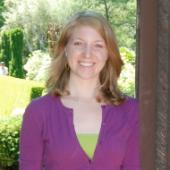A Message from Lauren Jensen '10
 |
Lauren Jensen Class of '10 French |
1. Are you currently employed in the work force or continuing your education? If so, where?
I am currently a graduate student of speech language pathology at MGH Institute of Health Professions in Boston, MA.
2. Do you enjoy what you're doing?
Absolutely! I feel so lucky to have found a field that is a perfect blend of all of my passions: language, science, art, and working with children. I can honestly say that I enjoy all the demands and challenges that graduate school and working in a clinic throws my way.
3. What are your plans for the future?
Once I graduate with my MS next August, I will have to complete a 10-month clinical fellowship before I can be fully certified as a CCC-SLP through the American Language and Hearing Association. As of right now, I am most interested in the developmental aspects of speech language pathology. I ideally want to work in a private clinic focusing on language delays and disorders in young children. Given my background in French, I am particularly interested in bilingual language development, so the opportunity to work with a bilingual French population would be amazing!
4. Have you ever been able to use your knowledge of French language/culture?
Not as much as I would like, but I am constantly surprised at the amount of francophones in the Boston area- I hear French in passing several times each week. I was also lucky enough start babysitting for a 2 year old girl who speaks French, English, and Swedish. She speaks only French with her mother and attends a bilingual French/ English preschool, so listening to her speak French and analyzing her language development is a great experience.
5. Do you find that the understanding of cultural differences that you've developed as a French major/minor plays a role in your life?
Yes, and I find this perspective is even more essential living in a metropolitan area such as Boston and as a future Speech Language Pathologist. With an ever-growing amount of multilingual and multicultural populations in the United States, so much of what I will need to do as an SLP is to distinguish between and language disorder and language difference so that a client can be diagnosed and treated in a culturally sensitive way. This includes being aware of the cultural and pragmatic norms of different groups, so that for instance the expectation for an Arab child to avoid eye contact with an adult is not misconstrued as a symptom of autism. Knowledge of Francophone cultures developed through my French education serves as a basis of this understanding. In addition, my French courses required the analysis of standard French and various dialects. This served as my first introduction to descriptive versus prescriptive language use: language as it is actually spoken versus language rules enforced by society. This is also important to me as an SLP because I need to be aware of and validate the linguistic equality of a client's native dialect while still teaching Standard American English.
6. Is there anything you'd like to share about your personal life?
While I have tried to keep up with my French by reading books, I haven't had many true opportunities to speak the language since graduating in 2010. Several weeks ago, I met a native French speaker and I was pleasantly surprised that I was still able to have an extended conversation with him. The vocabulary I learned in French courses to describe the nuances of language was quite useful when he asked all kinds of questions about my field! In the future, I hope to have more opportunities to practice my French in more conversational contexts. Several people in my graduate program were actually French majors or minors in undergrad as well, so we hope to start a discussion group to keep up our skills.
